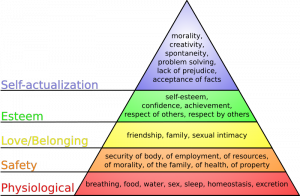There are criticisms the research of Abraham Maslow associated “the issues of human needs”. Maslow elaborated the basic human needs categorize like a pyramid named “hierarchy of needs”. He divided into five categories from the most primitive needs to the least needs: 1. physiological (breathing, food, water, sex, homeostasis, excretion, sleep), 2. safety (security of body, of employment, of resources, of morality, of the family, of health, of property), 3. love/belonging (friendship, family, sexual intimacy), 4. esteem (self-esteem, confidence, achievement, respect of others, respect by others), 5. self-actualization (morality, creativity, spontaneity, problems solving, lack of prejudice, acceptance of facts).
But according to some researchers such as Wahba and Bridgewell found little evidence for the ranking of needs Maslow described, or even for the existence of a definite hierarchy at all. Manfred Max-Neef criticized Maslow’s as there is no hierarchy at all for the human needs. He argued that “fundamental human needs” are non-hierarchical, and are ontologically universal and invariant in nature – part of the condition of being human; poverty, he argues, is the result of any one of these needs being frustrated, denied or unfulfilled. Manfred likely concluded that human needs defined by “satisfactoriness”.
| Need | Being (qualities) | Having (things) | Doing (actions) | Interacting (settings) |
|---|---|---|---|---|
| subsistence | physical and mental health | food, shelter, work | feed, clothe, rest, work | living environment, social setting |
| protection | care, adaptability, autonomy | social security, health systems, work | co-operate, plan, take care of, help | social environment, dwelling |
| affection | respect, sense of humour, generosity, sensuality | friendships, family, relationships with nature | share, take care of, make love, express emotions | privacy, intimate spaces of togetherness |
| understanding | critical capacity, curiosity, intuition | literature, teachers, policies, educational | analyse, study, meditate, investigate, | schools, families, universities, communities, |
| participation | receptiveness, dedication, sense of humour | responsibilities, duties, work, rights | cooperate, dissent, express opinions | associations, parties, churches, neighbourhoods |
| leisure | imagination, tranquillity, spontaneity | games, parties, peace of mind | day-dream, remember, relax, have fun | landscapes, intimate spaces, places to be alone |
| creation | imagination, boldness, inventiveness, curiosity | abilities, skills, work, techniques | invent, build, design, work, compose, interpret | spaces for expression, workshops, audiences |
| identity | sense of belonging, self-esteem, consistency | language, religions, work, customs, values, norms | get to know oneself, grow, commit oneself | places one belongs to, everyday settings |
| freedom | autonomy, passion, self-esteem, open-mindedness | equal rights | dissent, choose, run risks, develop awareness | anywhere |
